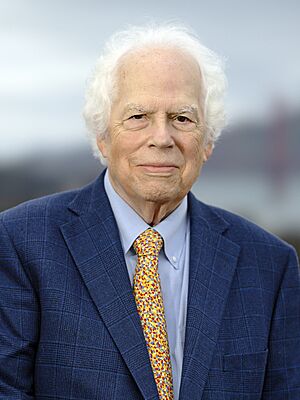Stanley B. Prusiner facts for kids
Quick facts for kids
Stanley B. Prusiner
|
|
|---|---|

Prusiner in 2024
|
|
| Born |
Stanley Ben Prusiner
May 28, 1942 Des Moines, Iowa, U.S.
|
| Nationality | American |
| Alma mater | University of Pennsylvania (BA, MD) |
| Known for |
|
| Spouse(s) | Sandy Turk Prusiner |
| Children | two |
| Awards |
|
| Scientific career | |
| Fields | |
| Institutions | |
Stanley Ben Prusiner (born May 28, 1942) is an American neurologist and biochemist. He is famous for discovering prions. Prions are a special type of pathogen (something that causes disease). They are mostly or entirely made of protein and can make copies of themselves.
When Dr. Prusiner first suggested this idea, many scientists thought it was very unusual. However, his research proved him right. He received the Albert Lasker Award for Basic Medical Research in 1994. Later, in 1997, he won the Nobel Prize in Physiology or Medicine. These awards were for his important work on prion diseases, which he and his team started studying in the early 1970s.
Contents
Early Life and Education
Stanley Prusiner was born in Des Moines, Iowa, in a Jewish family. His father, Lawrence Prusiner, was an architect. Stanley grew up in Des Moines and Cincinnati, Ohio. He went to Walnut Hills High School. Even then, he was known for being very smart.
He earned a Bachelor of Arts degree in chemistry from the University of Pennsylvania. He then went on to get his M.D. from the University of Pennsylvania School of Medicine. After medical school, Dr. Prusiner did an internship at the University of California, San Francisco (UCSF). He also spent three years at the National Institutes of Health (NIH), studying tiny organisms like E. coli.
Career and Research
After his time at NIH, Dr. Prusiner returned to UCSF. He completed a residency in neurology there. In 1974, he became a professor in the UCSF Department of Neurology. Since then, he has held many teaching and research positions at both UCSF and the UC Berkeley.
Since 1999, Dr. Prusiner has been the director of the Institute for Neurodegenerative Diseases research laboratory at UCSF. His team studies prion diseases, Alzheimer's disease, and other brain conditions. These include synucleinopathies and tauopathies, which also involve problems with proteins in the brain.
The Discovery of Prions
In 1998, Dr. Prusiner wrote an article about prions. He explained that the idea of prions being a type of protein was very new and different when it was first suggested.
Transmissible spongiform encephalopathies are diseases that make the brain look like a sponge, full of holes. Scrapie in sheep and other prion diseases cause this damage. For a long time, scientists didn't know what caused these strange diseases.
Dr. Prusiner and his team suggested a new idea. They thought the cause might be a "deadly version of a normal protein." This protein could then make more copies of itself in the brain. He called this new type of disease-causing agent a "prion." The word "prion" comes from "proteinaceous" (meaning made of protein) and "infectious" (meaning it can spread).
Awards and Achievements
Stanley Prusiner has received many important awards for his groundbreaking work.
- He won the Nobel Prize in Physiology or Medicine in 1997. This was for his explanation of diseases like scrapie, bovine spongiform encephalopathy (also known as "mad cow disease"), and human prion diseases such as Creutzfeldt–Jakob disease.
- He became a member of the United States National Academy of Sciences in 1992.
- He is also an elected member of the American Academy of Arts and Sciences (1993).
- In 1997, he became a Foreign Member of the Royal Society.
- He is also a member of the American Philosophical Society (1998), the Serbian Academy of Sciences and Arts (2003), and the Institute of Medicine.
Here are some of his other notable awards:
- Potamkin Prize for Alzheimer's Disease Research (1991)
- Metlife Foundation Award for Medical Research in Alzheimer's Disease (1991)
- Richard Lounsbery Award for Extraordinary Scientific Research (1993)
- Dickson Prize (1993)
- Gairdner Foundation International Award (1993)
- Albert Lasker Award for Basic Medical Research (1994)
- Paul Ehrlich and Ludwig Darmstaedter Prize (1995)
- Wolf Prize in Medicine (1996)
- Grand Prix Charles-Leopold Mayer (1996)
- Keio International Award for Medical Science (1996)
- Golden Plate Award of the American Academy of Achievement (1996)
- Louisa Gross Horwitz Prize from Columbia University (1997)
- Benjamin Franklin Medal from the Franklin Institute (1998)
- Honorary Doctorate from CEU Cardinal Herrera University (2005)
- National Medal of Science (2010)
See also
 In Spanish: Stanley B. Prusiner para niños
In Spanish: Stanley B. Prusiner para niños
- Frank Bastian
- Daniel Carleton Gajdusek
- Laura Manuelidis
- List of Jewish Nobel laureates
 | Emma Amos |
 | Edward Mitchell Bannister |
 | Larry D. Alexander |
 | Ernie Barnes |

